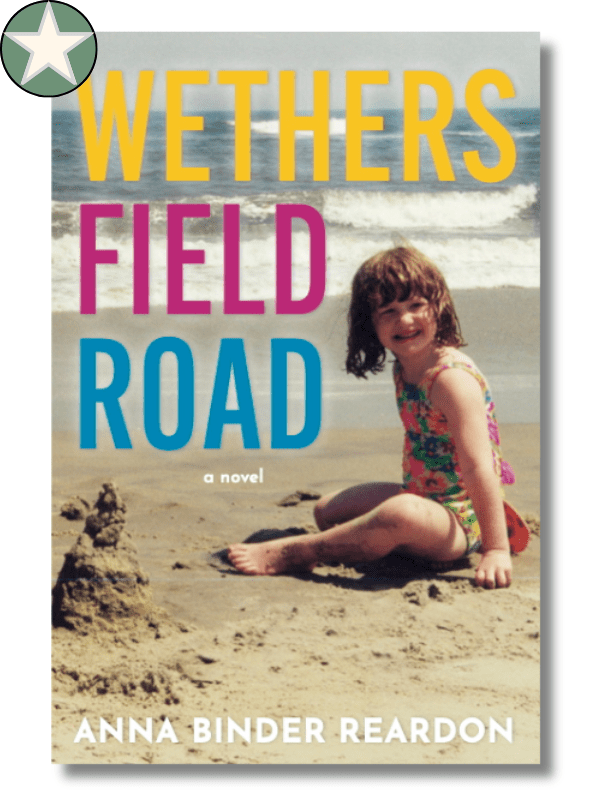Wethersfield Road
by Anna Binder Reardon
Genre: Literary Fiction
ISBN: 9798992419870
Print Length: 360 pages
Reviewed by Samantha Hui
Hopeful, introspective, and lyrical—a work of literary realism tinged with the grit of recovery
Wethersfield Road is a story about confronting the darkness within, facing addiction head-on, and learning what it means to love. Its author, Anna Binder Reardon, draws on her background in therapy to infuse the story with emotional insight and authenticity; she’s made a world that feels lived-in and characters whose struggles cut close to the bone. Themes of autonomy, self-confidence, and love as action anchor this moving tale.
“As she gazed out the bay window at the barely dark sky and inhaled that first, immaculate hit, a rare city-sky shooting star leaped across the horizon—as if the Universe, the house, and the Texas sky were conspiring against her indifference, insisting that Hope lived here too.”
Amelia Glickman has borderline personality disorder, suffers from bulimia, and is addicted to self-destruction in every form. But Amelia Glickman is also a musical theater-loving equestrian, who loves her dog Delilah, and longs to live a life worth living.
Wethersfield Road follows Amelia, a young woman in her early twenties, as she tries to rebuild her life after the implosion and final violence of a toxic relationship. In an attempt to run from her past, she moves to a new home on Wethersfield Road. But she keeps running right back into herself.
As her self-destructive behaviors escalate and begin to endanger the very things she loves, Amelia is forced to reckon with herself. The journey through rehabilitation that follows is neither linear nor easy, but it brings her closer to sobriety, self-respect, and a deeper understanding of love as something chosen, built, and sustained rather than stumbled upon.
“The bottom line is I’ve got a lot to figure out, but this place is making me fall in love with humans again. And I’m human, aren’t I?”
Told in the third person, the novel maintains a measured distance from Amelia, allowing readers to observe her life without being fully immersed in her perspective. What gives the book so much depth are the inclusions of Amelia’s journal entries that begin when she enters rehab. These intimate interludes are some of the book’s most powerful moments, revealing Amelia’s private longings, self-criticism, and flashes of romanticism. They remind us of how she is still just a young woman at 22 years old, searching for security though instinctually drawn to the rush of chaos. The interplay between the broader third-person narrative and the raw, confessional tone of the journals deepens our understanding of Amelia’s contradictions: her emotional intelligence shadowed by her self-protective cynicism, her capacity for love buried beneath self-defense mechanisms.
“There was no way to apologize to a horse. Amelia couldn’t simply sit down with Hope over coffee and own up to where she’d been wrong and say how sorry she was. The only way she had to clear the air was through her actions.”
Reardon depicts the realities of addiction and recovery with precision. She captures the cyclical nature of self-destructive behavior, the push and pull between wanting to change and cling to what’s familiar. Reardon’s background in therapy shows in the nuanced, believable portrayals of counselors and recovery spaces, as well as in the book’s underlying belief that healing is possible. The relationship between Amelia and her horse, Hope, is written with special tenderness; it becomes a metaphor for trust, responsibility, and the slow work of repair. There’s also a quiet beauty in the novel’s sensory moments, in the feel of a Texas evening sky, the grounding presence of animals, and the strange, stubborn hope that can surface even in despair.
“You’re a life force powerful enough to spring up through the concrete and grow towards the sun.”
Wethersfield Road is a meaningful exploration of what it means to save yourself. It asks its readers to reconsider love as deliberate, sustained action rather than whirlwind endeavors for dopamine. It’s a strong debut with real emotional honesty and a protagonist whose flaws are heartbreakingly human. A book for anyone who has ever had to rebuild, one brick at a time, while learning to live in their own skin.
Thank you for reading Samantha Hui’s book review of Wethersfield Road by Anna Binder Reardon! If you liked what you read, please spend some more time with us at the links below.
The post STARRED Book Review: Wethersfield Road appeared first on Independent Book Review.
